Related Research Articles

JBS S.A. is a Brazilian company that is the largest meat processing enterprise in the world, producing factory processed beef, chicken, salmon, pork, and also selling by-products from the processing of these meats. It is headquartered in São Paulo. It was founded in 1953 in Anápolis, Goiás.
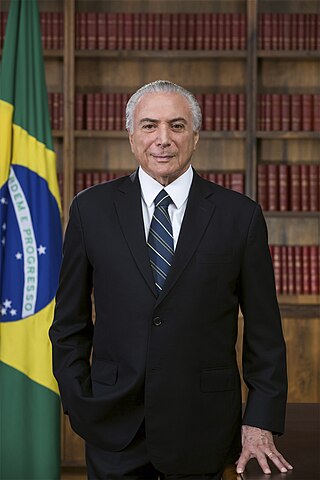
Michel Miguel Elias Temer Lulia is a Brazilian politician, lawyer and writer who served as the 37th president of Brazil from 31 August 2016 to 31 December 2018. He took office after the impeachment and removal from office of his predecessor Dilma Rousseff. He had been the 24th vice president of Brazil since 2011 and acting president since 12 May 2016, when Rousseff's powers and duties were suspended pending an impeachment trial.

Corruption in Brazil exists on all levels of society from the top echelons of political power to the smallest municipalities. Operation Car Wash showed central government members using the prerogatives of their public office for rent-seeking activities, ranging from political support to siphoning funds from state-owned corporation for personal gain. The Mensalão scandal for example used taxpayer funds to pay monthly allowances to members of congress from other political parties in return for their support and votes in congress. Politicians also used the state-owned and state-run oil company Petrobras to raise hundreds of millions of reais for political campaigns and personal enrichment.
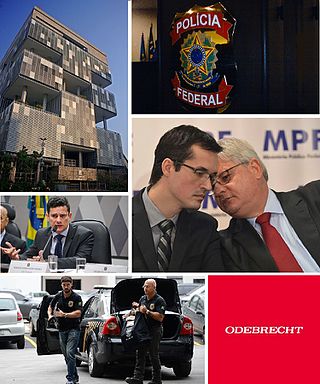
Operation Car Wash, or Operation Jet Wash was a landmark anti-corruption probe in Brazil. Beginning in March 2014 as the investigation of a small car wash in Brasília over money laundering, the proceedings uncovered a massive corruption scheme in the Brazilian federal government, particularly in state-owned enterprises. The probe was conducted through a joint task force of agents in the federal police, revenue collection agency, internal audit office and antitrust regulator. Evidence was collected and presented to the court system by a team of federal prosecutors led by Deltan Dallagnol, while the judge in charge of the operation was Sergio Moro. Eventually, other federal prosecutors and judges would go on to oversee related cases under their jurisdictions in various Brazilian states. The operation implicated leading businessmen, federal congressmen, senators, state governors, federal government ministers, and former presidents Collor, Temer and Lula. Companies and individuals accused of involvement have agreed to pay 25 billion reais in fines and restitution of embezzled public funds.
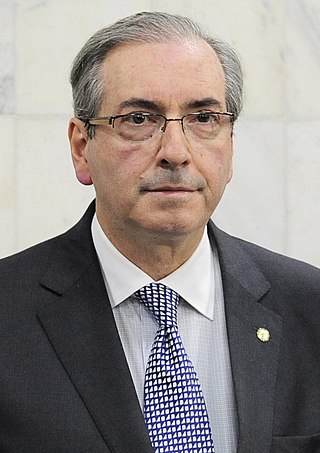
Eduardo Cosentino da Cunha, is a Brazilian politician and radio host, born in Rio de Janeiro. He was President of the Chamber of Deputies of Brazil from February 2015 until 5 May 2016, when he was removed from the position by the Supreme Court. BBC News labeled him the "nemesis" of Brazilian President Dilma Rousseff.

Events in the year 2017 in Brazil.

The Operation Carne Fraca is an operation started on March 17, 2017, and enforced by the Federal Police of Brazil, that country's federal police force, which investigated some of the country's largest meat processing companies. The name is a pun between the operation's concern with meat and the Bible verse about "weak flesh" – as a result, it is sometimes translated "Operation Weak Flesh".
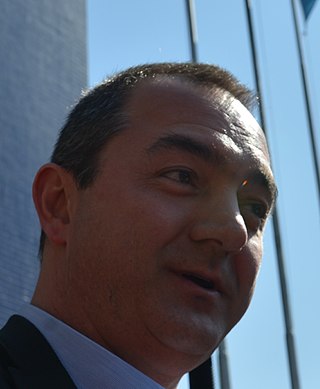
Joesley Mendonça Batista is a Brazilian businessman, son of José Batista Sobrinho. He is responsible for the expansion and internationalization process of JBS S.A., the largest meat-packing company in the world, and one of the main agribusiness companies in Brazil, and J&F Investimentos which he shares with his wife, Flora, and five children. As of October 2021, his net worth was estimated at US$4.1 billion.
Wesley Mendonça Batista is a Brazilian billionaire businessman, and founder of JBS S.A. Batista was the president of the JBS group and was responsible for the implementation of JBS operations in the US since the acquisition of Swift in 2007.
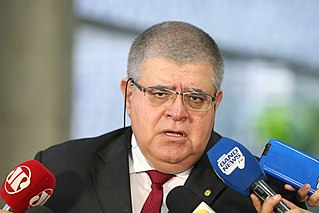
Carlos Eduardo Xavier Marun is a Brazilian politician, member of the Chamber of Deputies, lawyer and civil engineer. He is part of the Brazilian Democratic Movement Party (PMDB). Currently, is Secretary of Government, nominated by president Michel Temer.

Onyx Dornelles Lorenzoni is a Brazilian politician, businessman, and veterinarian. A member of the Liberal Party (PL), he served as a federal deputy from Rio Grande do Sul for five terms. After the 2018 Brazilian general election, the president-elect Jair Bolsonaro invited Lorenzoni to be his Chief of Staff. He was also designated leader of the transition team.
A special election for the position of president of the Chamber of Deputies of Brazil took place on July 14, 2016, during the 55th legislature. The election was necessary due to the resignation of Eduardo Cunha, announced on the 7th of that month. According to the Brazilian Constitution, the president of the Chamber of Deputies is the second in line of succession to the Presidency of the Republic.

A long series of criminal investigations have occurred in Brazil associated with Operation Car Wash, since the first one began in March 2014. These investigations are considered offshoots of the original phased investigations.

The JBS Testimonies in Operation Car Wash refer to the leniency agreement signed between the company JBS and the Office of the Attorney General of Brazil (PGR) in April 2017, within the scope of Operation Car Wash. The Brazilian Supreme Federal Court (STF) approved the agreement on May 18, 2017, based on the plea bargain of the owners Joesley and Wesley Batista and executives of the company. On September 14, 2017, former Attorney General Rodrigo Janot rescinded the agreement with Joesley and Ricardo Saud due to suspicions of obstruction of investigation by the collaborators. The following year, Attorney General Raquel Dodge rescinded the agreement with Wesley Batista and Francisco de Assis e Silva due to their omission of criminal facts of which they were aware.

The accusations against Michel Temer by the Office of the Attorney General of Brazil consisted of two accusations for common crimes filed by the Attorney General of Brazil, Rodrigo Janot, against the President of the Republic, Michel Temer, based on the crimes of passive corruption, criminal organization, and obstruction of justice, within the scope of Operation Car Wash.
Port Investigation refers to a police inquiry under the responsibility of the Federal Police of Brazil that investigates the alleged favoritism of companies connected to the port sector by a decree signed by President Michel Temer, which extended concession contracts at the Port of Santos. The company Rodrimar was said to be the main beneficiary of the decree issued by Temer, which, according to investigators, was edited in exchange for bribes to the president and his main allies. For the first time in the country's history, a sitting president has had their bank records broken as a result of an investigation. In addition, the investigation led to Operation Skala, which temporarily arrested allies and friends of the president, as well as businessmen from the port sector. The case is being handled by Luís Roberto Barroso, a justice of the Supreme Federal Court. The inquiry was concluded on October 16, 2018, resulting in the indictment of eleven individuals, including Michel Temer and his daughter Maristela, with requests for the seizure and blocking of assets of all the accused and requests for the preventive imprisonment of four of them. The rapporteur forwarded the inquiry to the Attorney General's Office for a response within 15 days.
In Brazil, several parliamentary inquiries (CPIs) have been established over the years.
The removal of Aécio Neves from the Federal Senate of Brazil stems from a provisional decision granted by Supreme Court (STF) Minister Edson Fachin on Thursday, May 18, 2017, determining the removal of Aécio Neves (PSDB-MG) from his position as senator. The accusation is that he allegedly asked for two million reais from the owners of the JBS meatpacking company. On May 31, 2017, through electronic drawing, Minister Marco Aurélio Mello was chosen as the new rapporteur of the process.
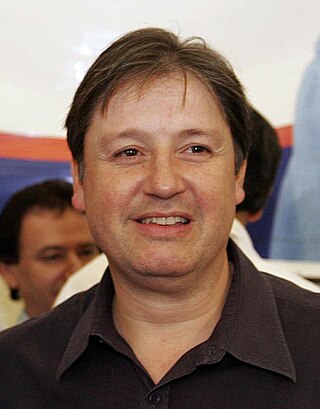
Rodrigo Santos da Rocha Loures is a Brazilian business administrator and politician, affiliated with the Brazilian Democratic Movement Party (PMDB). He served as a Federal Deputy for Paraná and was a member of the National Executive Committee of the PMDB. He is the son of the founder of Nutrimental, Rodrigo Rocha Loures.
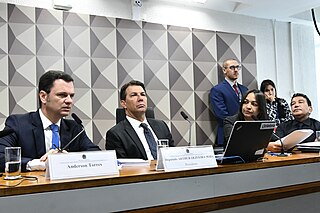
The 8 January CPMI was a parliamentary inquiry commission in Brazil that investigated the invasion and attack of the Praça dos Três Poderes against the National Congress of Brazil on 8 January 2023.
References
- ↑ "Instalada a CPI mista da JBS e J&F". Senado. Retrieved September 26, 2017.
- 1 2 3 Mirthyani Bezerra. "CPI da JBS aprova convidar Janot e convocar ex-procuradores e irmãos Batista". Uol. Retrieved September 26, 2017.
- 1 2 3 "Um terço dos membros da CPI da JBS já foi financiado pela empresa". Correio Braziliense. September 13, 2017. Retrieved September 26, 2017.
- 1 2 Débora Brito. "Carlos Marun é escolhido relator da CPI da JBS no Congresso". Agência Brasil. EBC. Retrieved September 26, 2017.
- ↑ "Caiado é eleito vice-presidente de CPI Mista que vai investigar JBS". O Popular. September 5, 2017. Retrieved September 26, 2017.
- ↑ Luiz Maklouf Carvalho. "Relator de CPI da JBS é acusado de desvio de R$ 16,6 mi". Estadão. Retrieved September 26, 2017.
- ↑ Catarina Alencastro. "CPI da JBS aprova convocações de Joesley, Wesley, Saud e Marcello Miller". O Globo. Globo.com. Retrieved September 26, 2017.
- 1 2 Mirthyani Bezerra. "Integrantes da CPI da JBS dizem que comissão quer constranger o MPF e que acabará em pizza". Uol. Retrieved September 26, 2017.
- 1 2 Rodrigo Serpa. "CPI da JBS tem integrantes que receberam doações da empresa". CBN. Globo.com. Retrieved September 26, 2017.
- ↑ "CPI da JBS viola independência do Judiciário e do Ministério Público, afirma senador". Consultor Jurídico. September 21, 2017. Retrieved September 26, 2017.
- ↑ Débora Bergamasco e Mateus Coutinho (September 22, 2017). "Aliados de Michel Temer manobram CPI contra Janot e delatores da JBS". Época. Globo.com. Retrieved September 26, 2017.
- ↑ "CPI da JBS blinda Lula, convida Janot e convoca Joesley". Último Segundo. iG. Retrieved September 26, 2017.
- ↑ "Governo quer usar CPI da JBS para mudar regra de delação". O Antagonista. September 16, 2017. Retrieved September 26, 2017.
- ↑ "CPI do Janot". O Antagonista. June 13, 2017. Retrieved September 26, 2017.